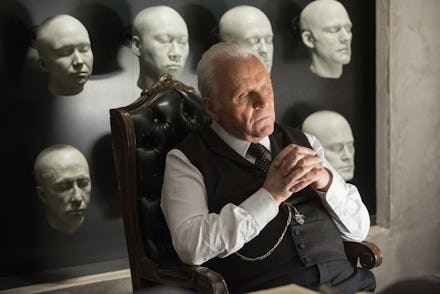'Westworld' episode 3 shows a new story — and a terrifying concept for the series' future

There's a fascinating conflict of interest for the creator of Westworld, Ford, that takes center stage in the titular HBO series' third episode. He understands the baser impulses of the park's guests: violence against and sex with the robotic Hosts. Yet Ford also reminds his employees that guests will return for the "subtleties" of the fictitious wild, wild west that are hidden in the details.
This sounds promising on paper, but the new narrative for the park that Ford's unveiled doesn't merely deliver thrills: It's nightmarish, and leaves a few terrified guests fleeing the story before its conclusion. In turn, the new storyline feels less like an addition to Westworld as a meta-prediction for the ultimate future of the series.
The new storyline's villain is programmed to be self-aware. Ford's new narrative is linked to Teddy's mysterious backstory, one that prevents him from running away with fellow lovestruck Host Dolores. Ford admits the reason Teddy's background was ambiguous was simply because they didn't write one for him. Now, however, he's related to the new story's main villain, Wyatt.
Wyatt is a Wyatt Earp-esque former Army sergeant who slaughters his men — sans Teddy — and is compelled to do so to appease a God-like figure. As Teddy explains, Wyatt's understanding of Westworld is that it's one that doesn't belong to cowboys or explorers: It belongs to God, or in the Hosts' case, Ford. Joining Wyatt's bloodthirsty crusade is a slew of masked figures who maim and brutally murder any confronting Hosts.
Obviously, the Hosts are (for now) programmed in such a way that they can't hurt any of the human guests — though it doesn't stop many of them from fleeing once the bullets start flying in an ambush. But the conceit lies in Wyatt's programmed ideology: He's designed to be self-aware much in the way Dolores is slowly learning about her own reality with the help of Bernard.
Yes, that's how the Hosts will likely revolt. The Wyatt story seems to point to where Dolores' path is leading. She's already beginning to understand she can't escape her fixed routine — even asking Teddy about running away together elicits a "some day" response from him, which, she notes, is intentionally vague. But the more she follows the daily cycle, the more she glitches in and out of the present day with previous memories in the same location (like many instances of sexual assault in her family barn).
Within three episodes, Dolores has gone from not being able to swat a fly to, well, swatting a fly and shooting one of her would-be rapists. It's no coincidence that the Shakespeare quote about revolt is what serves as a wake-up call for the Hosts to question their reality: "These violent delights have violent ends."
Dolores is the catalyst for this anticipated, Host-wide revolt. Like in Wyatt's story, she hears a voice in her head that compels her to break free from her programming. But whether that makes her the series' villain or hero is ultimately up to the viewer.
Are the Hosts following Arnold's plan? The wildest instances of Hosts breaking free from their programming have had one thing in common: They mention someone named Arnold in their soliloquies. But who is he?
As Ford explains to Bernard, Arnold was Westworld's co-creator. However, he and Arnold had conflicting philosophies on the plan for the park, as well as its Hosts. Arnold wanted them to achieve an almost human-like level of consciousness. Ford, meanwhile, saw them fit in the way they're treated in Westworld's current iteration: convincingly lifelike artificial intelligence that ultimately caters to the (usually sadistic) whims of the park's guests.
Ford says Arnold spent the latter part of his time at Westworld mostly interacting with the Hosts before — as Ford insinuates — he killed himself, while making it look like an accident. Arnold's involvement in Westworld is erased from park history, as well as his ambitious plans for the Hosts.
Or are they? Ford's shifty behavior makes him an unreliable narrator, and there's more than a touch of irony in the Hosts becoming more attuned to their reality after his latest update to their programming in the show's premiere. It feels less like an improvement to the park — or any help to Ford's apparent God complex — and more of a turn toward Arnold's plan for the Hosts.
Arnold could be the voice Dolores and the other Hosts hear in their heads. Conversely, it could be Bernard's own continuation of Arnold's work, considering he holds secret meetings with Dolores that test the limit of her cognitive abilities (the voice also bears some likeness to Bernard's). However, whichever direction Westworld goes, it holds the key to the Host's, and the series' future. As Dolores tells Bernard: "When I discover who I am, I'll be free."